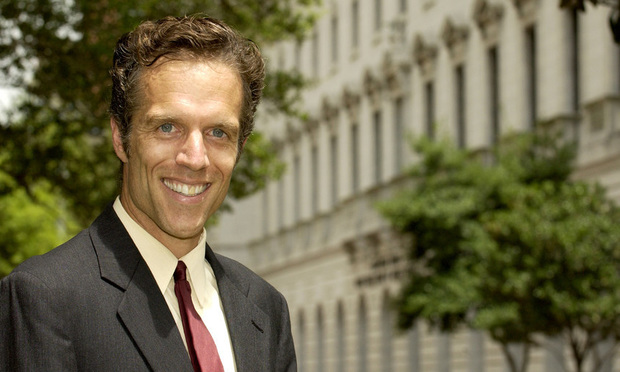Claim That Driver's 'Neurobiological Response' to iPhone Text Caused Fatal Wreck Rejected at 5th Circuit
The U.S. Court of Appeals for the Fifth Circuit has a rejected a products liability claim against Apple alleging that a woman's neurobiological response to looking at a text message on her iPhone 5 while behind the wheel was the cause of a car crash that killed two people and paralyzed a child.
December 19, 2018 at 03:53 PM
4 minute read
 U.S. Fifth Circuit Judge Stephen Higginson/courtesy photo
U.S. Fifth Circuit Judge Stephen Higginson/courtesy photo
The U.S. Court of Appeals for the Fifth Circuit has a rejected a products liability claim against Apple alleging that a woman's neurobiological response to looking at a text message on her iPhone 5 while behind the wheel was the cause of a car crash that killed two people and paralyzed a child.
The Fifth Circuit's decision in Meador v. Apple focuses on a 2013 wreck involving Ashley Kubiak, who was driving her pickup truck when she looked down to read a text message on her phone. She then turned her attention back to the road, but at that point it was too late, and the collision killed two adults and rendered a child paraplegic. Kubiak was later convicted of two counts of criminally negligent homicide.
Family members later sued Apple in a Tyler U.S. District Court for negligence and product liability. The plaintiffs' complaint alleged that Apple, because of its concern over texting-while-driving accidents, had secured a patent covering a lockout mechanism for hand-held devices, but did not implement any version of the mechanism on the iPhone 5.
The plaintiffs also alleged that Apple failed to warn iPhone 5 users about the risks of distracted driving. Specifically, the plaintiffs cited studies and reports concluding that the receipt of a text message triggers in the recipient “an unconscious and automatic neurological compulsion to engage in texting behavior.”
Apple filed a motion to dismiss for failure to state a claim. And the Eastern District of Texas court later granted Apple's motion. The plaintiffs appealed to the Fifth Circuit.
In its decision on Dec. 18, the Fifth Circuit noted that no court in Texas has addressed whether a smartphone manufacturer can be held liable for a user's tortious acts because of a neurobiological response induced by a phone.
And because there was no guidance from Texas courts on the matter, the Fifth Circuit had to make a so-called Erie guess on how the Texas Supreme Court would rule in the case.
The Fifth Circuit found that the closest analogy in Texas civil law to the liability proposed by the plaintiffs is the state's dram shop law, which permits sellers of alcohol to be held liable for the torts committed by the intoxicated customers they serve. The court also noted that the dram shop law was the product of the Texas Legislature, a statute that was later vetted by state courts.
“To the extent there is a meritorious analogy between smartphone manufacturers and dram shops, it is for the state to explore, not us,” wrote Judge Stephen Higginson. “With the state not yet speaking to this issue, we note that the debilitating effects of alcohol have been recognized much longer than the effects of smartphones, and the proper regulation of the former has been debated much longer than the latter.
“Moreover, the law development that has occurred places the onus of distracted driving on the driver alone,” Higginson explained, referencing a 2017 law passed by the Texas Legislature that criminalizes reading, writing or sending a text message while driving.
“We therefore cannot say that Texas law would regard a smartphone's effect on a user as a substantial factor in the user's tortious acts. To say otherwise would be an innovation of state law that Erie does not permit us to make,” Higginson wrote. “Because we decline to consider 'neurobiological compulsion' a substantial factor under Texas law, we conclude that the iPhone 5 could not be a cause in fact of the injuries in this case.”
Greg Love, a Henderson attorney who represents the plaintiffs in the case, said his clients are considering their appellate options. A big issue in the case is whether Apple designed the iPhone 5 in a way that stimulates a user's brain function so that the phone would be used compulsively, he said.
“That's the issue that the Fifth Circuit identified as something they view as innovative,” Love said. “And that's the key issue in terms of liability, and that's what the trial court missed, in my opinion.''
Theodore J. Boutrous, a partner in the Los Angeles office of Gibson, Dunn & Crutcher who represents Apple in the case, did not return a call for comment.
This content has been archived. It is available through our partners, LexisNexis® and Bloomberg Law.
To view this content, please continue to their sites.
Not a Lexis Subscriber?
Subscribe Now
Not a Bloomberg Law Subscriber?
Subscribe Now
NOT FOR REPRINT
© 2025 ALM Global, LLC, All Rights Reserved. Request academic re-use from www.copyright.com. All other uses, submit a request to [email protected]. For more information visit Asset & Logo Licensing.
You Might Like
View All
Texas-Based Ferguson Braswell Expands in California With 6-Lawyer Team From Orange County Law Firm
2 minute read

Crypto Entrepreneur Claims Justice Department’s Software Crackdown Violates US Constitution
4 minute read
SCOTUSblog Co-Founder Tom Goldstein Misused Law Firm Funds, According to Federal Indictment
2 minute readTrending Stories
Who Got The Work
J. Brugh Lower of Gibbons has entered an appearance for industrial equipment supplier Devco Corporation in a pending trademark infringement lawsuit. The suit, accusing the defendant of selling knock-off Graco products, was filed Dec. 18 in New Jersey District Court by Rivkin Radler on behalf of Graco Inc. and Graco Minnesota. The case, assigned to U.S. District Judge Zahid N. Quraishi, is 3:24-cv-11294, Graco Inc. et al v. Devco Corporation.
Who Got The Work
Rebecca Maller-Stein and Kent A. Yalowitz of Arnold & Porter Kaye Scholer have entered their appearances for Hanaco Venture Capital and its executives, Lior Prosor and David Frankel, in a pending securities lawsuit. The action, filed on Dec. 24 in New York Southern District Court by Zell, Aron & Co. on behalf of Goldeneye Advisors, accuses the defendants of negligently and fraudulently managing the plaintiff's $1 million investment. The case, assigned to U.S. District Judge Vernon S. Broderick, is 1:24-cv-09918, Goldeneye Advisors, LLC v. Hanaco Venture Capital, Ltd. et al.
Who Got The Work
Attorneys from A&O Shearman has stepped in as defense counsel for Toronto-Dominion Bank and other defendants in a pending securities class action. The suit, filed Dec. 11 in New York Southern District Court by Bleichmar Fonti & Auld, accuses the defendants of concealing the bank's 'pervasive' deficiencies in regards to its compliance with the Bank Secrecy Act and the quality of its anti-money laundering controls. The case, assigned to U.S. District Judge Arun Subramanian, is 1:24-cv-09445, Gonzalez v. The Toronto-Dominion Bank et al.
Who Got The Work
Crown Castle International, a Pennsylvania company providing shared communications infrastructure, has turned to Luke D. Wolf of Gordon Rees Scully Mansukhani to fend off a pending breach-of-contract lawsuit. The court action, filed Nov. 25 in Michigan Eastern District Court by Hooper Hathaway PC on behalf of The Town Residences LLC, accuses Crown Castle of failing to transfer approximately $30,000 in utility payments from T-Mobile in breach of a roof-top lease and assignment agreement. The case, assigned to U.S. District Judge Susan K. Declercq, is 2:24-cv-13131, The Town Residences LLC v. T-Mobile US, Inc. et al.
Who Got The Work
Wilfred P. Coronato and Daniel M. Schwartz of McCarter & English have stepped in as defense counsel to Electrolux Home Products Inc. in a pending product liability lawsuit. The court action, filed Nov. 26 in New York Eastern District Court by Poulos Lopiccolo PC and Nagel Rice LLP on behalf of David Stern, alleges that the defendant's refrigerators’ drawers and shelving repeatedly break and fall apart within months after purchase. The case, assigned to U.S. District Judge Joan M. Azrack, is 2:24-cv-08204, Stern v. Electrolux Home Products, Inc.
Featured Firms
Law Offices of Gary Martin Hays & Associates, P.C.
(470) 294-1674
Law Offices of Mark E. Salomone
(857) 444-6468
Smith & Hassler
(713) 739-1250






